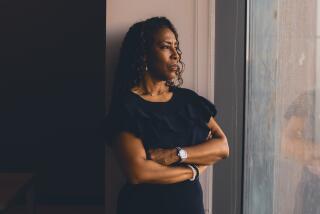Overton Spars With Prosecutor : Trial: Murder defendant insists in cross-examination he didn’t poison his wife but concedes they had had marital problems.
SANTA ANA — During a contentious cross-examination, a Dana Point man was grilled Tuesday about his “love-hate” relationship with the wife he is accused of killing with cyanide.
Richard K. Overton, who is on trial for first-degree murder, frequently sparred with Deputy Dist. Atty. Christopher J. Evans, accusing the prosecutor of having “a very suspicious mind” and a talent for misquoting him.
Despite his denial that he killed his wife, Janet L. Overton, the 64-year-old computer consultant conceded that he had had “big problems” in his marriage and on one occasion felt “pure hatred” for her. But that hatred, which was detailed in an April, 1986, letter to a female friend in Alabama, quickly subsided and never returned, Overton said.
Evans, however, suggested that Overton’s hatred had been brewing through much of his 19-year marriage and ultimately led him to murder his wife Jan. 24, 1988.
“Isn’t it fair to say that there are two Richard Overtons?” Evans asked. “There’s the Richard Overton that you like to present to people and then there’s the real Richard Overton.”
“Absolutely not,” Overton responded over his attorney’s objection, which was sustained by Superior Court Judge David O. Carter as argumentative.
The sniping between the defendant and prosecutor forced Carter to interrupt at one point to settle things down, saying: “This could get out of control quickly.”
Many of Evans’ questions centered on diary entries Overton meticulously kept in journals and on his home computer during his marriage. The prosecutor has referred to them as the “loathing diaries” because he said they show that Overton was vindictive, jealous and consumed with his wife’s infidelities.
Overton agreed with Evans that many of the entries show “negative” and “horrible” feelings but added that they did not fully reflect his relationship with his wife or detail the “strong bonds of love” they had.
But he also testified that he and his wife “had reasons for animosity” toward each other. Overton said his feelings stemmed from his wife’s sexual affairs throughout their marriage.
Evans has said that Overton suspected at least 17 men of sleeping with his wife. One former lover, Bill Dawson, a high-ranking Capistrano Unified School District official, testified earlier in the trial that he had a sexual relationship with Janet Overton from the early to mid-1980s.
Dawson’s name and references to his boat repeatedly came up in Overton’s diaries.
“I was very suspicious of him,” Overton testified, adding that he didn’t like his wife going to Dawson’s boat.
“Isn’t that where she was going on the day she died?” Evans asked.
“Yes,” Overton answered.
The diaries not only recorded how Overton felt, but also offered a glimpse into how his wife apparently viewed the marriage.
In his diaries, Overton quoted his wife as saying she “hated” her husband, that the marriage was “one of convenience,” that she wanted a divorce, and that she hoped her husband would die.
Overton also acknowledged diary entries that show he spied on his wife’s whereabouts and surreptitiously took inventory of what he described as her “seduction gear,” including vibrators, condoms and other sexual items.
Yet, despite such comments, Overton testified that he and his wife were moving past their problems and growing as a couple several months before she died.
“We probably had the best times of our marriage in that I felt we laid a foundation, we understood each other, we knew where we were coming from, we knew our strengths and our weaknesses, we were in a position to have a love based on knowledge and not a love based on illusion,” he told the jury.
At one point, Overton, a math scholar and doctor of psychology, grew tired of repeated questions on the meaning of his diary entries.
“I’ve done a little arithmetic,” he said. “There are over 40,000 entries you have to draw from. When you take out any one of those entries and say, ‘Why did you write that one?’ my first reaction, frankly, is, ‘It beats the hell out of me.’ ”
Evans also attacked Overton for lies he allegedly told sheriff’s detectives during an interview about his wife’s death.
“Are there things that you hid from Detective (Tim) Carney?” Evans asked.
“I’d like you to be a little more specific,” Overton said. “I didn’t tell him about ingrown toenails.”
“Is that what you think I’m getting at?” asked Evans.
“I think you’re playing games,” Overton responded.
Overton, however, admitted that he was less than candid on at least one occasion in the interview. He said he “exaggerated” about the amount of time that had lapsed between the last time he had sex with his wife and her death. He told investigators they had sexual relations several months before her death, when actually, it had been more than two years--which was frequently stated in the diaries.
Overton also did not tell the investigators about all the men he suspected of having affairs with his wife, Evans charged.
“My feelings (about her affairs) became much more mellow” after her death, he said.
Overton further testified that he may have been a little “evasive” with a sheriff’s detective who in 1973 questioned him about an alleged poisoning incident involving his first wife, Dorothy Boyer.
Under direct examination Monday, Overton said he put prescription drugs in Boyer’s coffee without her knowing on several occasions, with the goal of giving her “a tummy ache.” He said he was mad at her for neglecting their daughters, who were in her custody.
Overton said he did not want to discuss the Boyer incident with detectives during the investigation into Janet Overton’s death because he didn’t think it was relevant.
The cross-examination is expected to continue today.
More to Read
Sign up for Essential California
The most important California stories and recommendations in your inbox every morning.
You may occasionally receive promotional content from the Los Angeles Times.










